49 F. high temperature in St. Cloud Thursday.
36 F. average high on March 10.
61 F. high on March 10, 2015.
March 11, 2009:
Cold conditions arrive, with a new record for the lowest maximum
temperature in St. Cloud for this date. The high temperature in St.
Cloud was only 4 degrees, which broke the previous record lowest maximum
temperature of 5 degrees that was set in 1948.
March 11, 1878: Lake Minnetonka becomes ice-free due to one of the warmest winters on record.
Spring Fever Alert - Cold Correction Next Week"Spring
is nature's way of saying 'Let's party!'" said the late, great Robin
Williams. Actually, I think he shouted it. You may be tempted to shout
for joy as the mercury hits 60F each of the next 5 days. Not bad for the
second week of March.
To put things into stark perspective over 8
inches of snow fell on March 11, 1962. On this date in 1948 the Twin
Cities woke up to a refreshing -27F air temperature. That's what COULD
be floating outside your window right now.
Saturday
still looks like the better day to emerge from extended hibernation,
take a walk or bike ride; soaking up a mild whiff of May in March.
The same storm flooding Louisiana with 20-25 inches of rain (2 tropical storm's worth) will spin up a few rain showers here
Sunday.
Steadier rain
Tuesday precedes a push of cooler air next week. Expect 40s, maybe 30s
in 7 days
with a few obligatory snow flurries to remind you it's March. At least
on paper. A mild, zonal, Pacific-modified flow returns by late March.
Not as toasty as March of 2012, but close. Another 7-month boating season in Minnesota this year? Looks like it.
Waves of Warmth.
Expect 60s today, again Saturday - 60-degree warmth possible as far
north as Brainerd; temperatures as much as 20-25F warmer than average
for mid-March. 2-meter temperature forecast: NOAA 12KM NAM and
AerisWeather.
Mild-ish 'Til Tuesday, Then Chilling Off.
Models are in fairly good agreement that we'll see 50s and 60s for the
next 4 days, before cold exhaust on the backside of a potentially
significant midweek storm pumps colder air back into town. Parkas
optional, but a sturdy jacket will be required by late next week.
A Soaking Slush-Storm Next Week?
NOAA NDFD and GFS print out over 3" of (liquid) precipitation next
week, the best chance of heavy rain Tuesday night - possibly ending as
some slushy snow by Wednesday. Graphic: Aeris Enterprise.
Historic Flooding for Louisiana - Gulf Moisture Surges North.
We'll see showery rains on Sunday (possibly enough rain to keep
temperatures in the 50s), but a much more significant full-latitude
trough may spin up a windblown storm here Tuesday into Wednesday. A few
models suggest the storm may "cut-off", temporarily stalling, prolonging
the rain, wind and even a period of accumulating snow. The worst of
winter is definitely behind us, but there will be relapses the next few
weeks. We're not entirely out of the woods just yet.
 Windiest Days: Tuesday - Wednesday
Windiest Days: Tuesday - Wednesday.
GFS guidance shows sustained winds of 38 mph Tuesday night, hinting at
gusts as high as 40-50 mph as a potentially big storm winds up close to
home. Details remain sketchy, but we're due for a "storm". Source: NOAA
and Aeris Enterprise.
No Cause For Panic - Yet.
This is because I was foolish enough to pull my driveway stakes out
Thursday. NOAA's GFS simulation pulls enough cold air southward for a
changeover to snow Wednesday. I'm not convinced we'll see plowable
amounts, but at this point nothing would surprise me. Stay tuned.
Over 20" Of Rain Is Triggering Historic Flooding In Parts of the South.
The Weather Channel has an update: "
Torrential
rainfall continues to swamp parts of the South, smashing March records,
and triggering major flash flooding and worsening river flooding in
parts of Louisiana, Texas, Arkansas and Mississippi. Heavy rain has also
spread into parts of western Tennessee and western Kentucky. Over 20
inches of rain has fallen near Monroe, Louisiana, prompting numerous
rescues. Flash flood emergencies remained in effect Thursday morning in
Shreveport, Louisiana, where up to 16 inches of rain had fallen in the
metro area. Flooding also inundated homes in Greenville, Mississippi,
and Dermott, Arkansas..."
* Details on historic flooding underway in northwestern Louisiana from
The Shreveport Times.
Devastating Flooding Grips Lower Mississippi River Valley, Fed by Freak, Snowy Mexican Weather System.
More evidence of weather getting "stuck" for extended periods of time?
Jason Samenow has a good analysis of the extreme, potentially historic
flooding underway across Louisiana, Mississippi and Arkansas at
Capital Weather Gang: "...
Meteorologists
call this kind of narrow, intense stream of moisture an “atmospheric
river”. These rivers are most common in the Pacific and bring California
the bulk of its winter rain. Given its Mexican pedigree, some are
calling this particular atmospheric river in the south central
U.S. a “Mayan Express.” (Simultaneously, an atmospheric river with
origins near Hawaii known as a “Pineapple Express” is hitting northern
California and the Pacific Northwest.)..."
Image credit above:
Martin Ralph, Scripps Institution of Oceanography.
The World's Best Long Range Weather Model Just Got Better.
Why do I babble about ECMWF so much? Because it's still the best
weather model in the world. That doesn't make me happy, but it's a
reality, based on unbiased metrics. NOAA is reinvesting, GFS is now
considerably better, but it seems that we are in perpetual catch-up mode
with "The European". Here's an excerpt from meteorologist Dan
Satterfield at AGU Blogosphere: "Synoptic
weather forecasters like me have been looking forward to the upgraded
ECMWF forecast model for months now. This model is already the guidance
of choice for medium and long range forecasts (2-10 days), and now it is
running at an even higher resolution with other improvements as well.
An ensemble of several different daily runs (that is key to diagnosing
which solution is more likely when models differ) is also now running at
greater resolution, and this will likely improve long range forecasts
around the world. Some of this data is online, but the good stuff you have to pay for, and trust me it’s quite good..."
El Nino and Extreme Weather Will Be a Theme in 2016. So says meteorologist Eric Holthaus at
Slate; here's an excerpt of a recent post: "...
Over the past month or two, the ocean temperature in the tropical Pacific has started to decline, but that doesn’t mean El Niño’s effects are waning. In fact, due to an atmospheric lag,
extreme weather will likely keep getting worse for several more months.
Though El Niño is typically the most powerful player among the world’s
constantly feuding meteorological morphologies, it takes months
for its burst of heat to filter around the globe from the tropical
Pacific. Ocean temperatures in the El Niño regions of the Pacific
usually peak in November or December, but globally-averaged temperatures
don’t typically peak until between February and July of the following
year..."
Animation credit:
NOAA CPC.
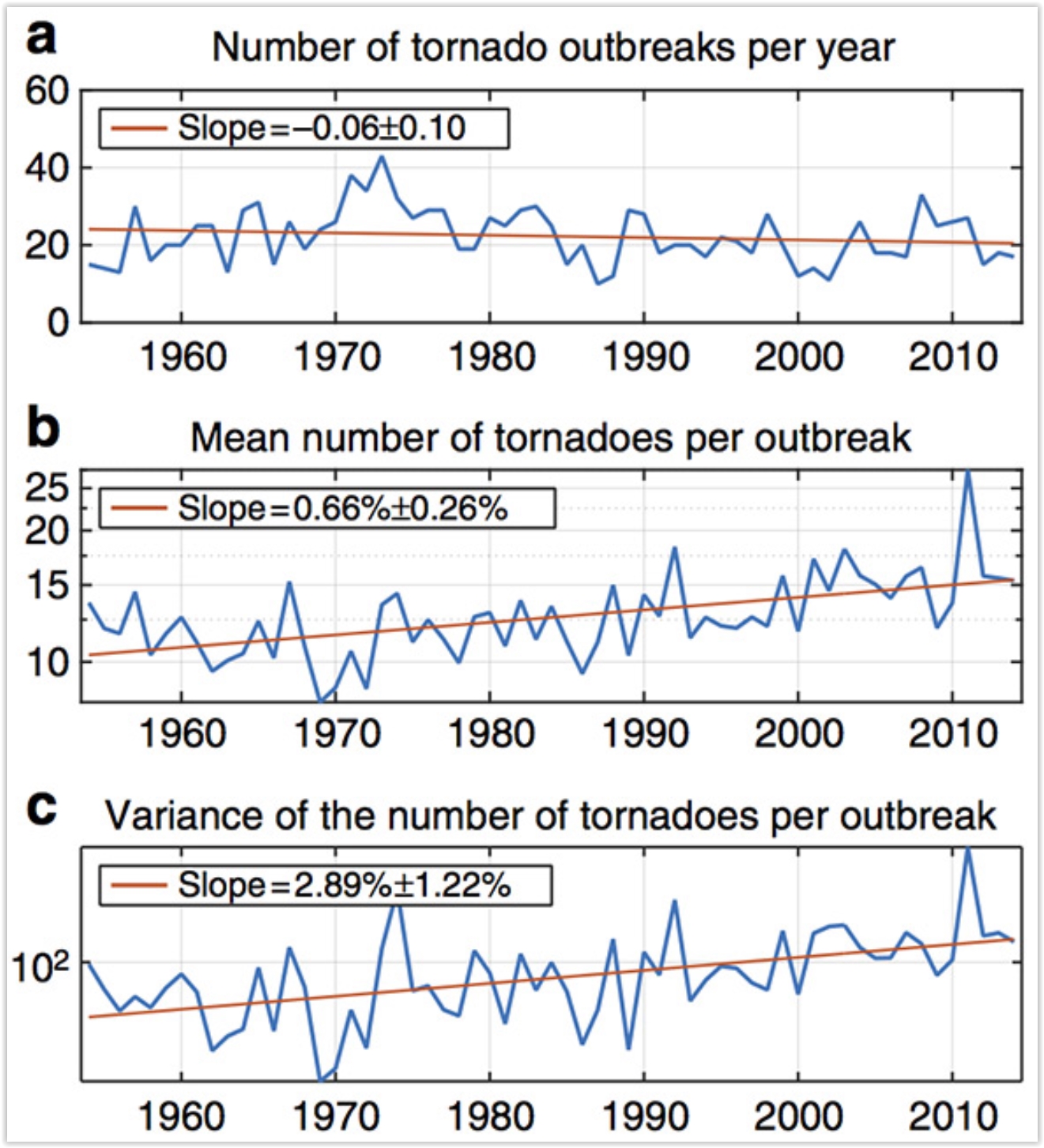 New Study Shows Severe Tornado Outbreaks Are On The Rise
New Study Shows Severe Tornado Outbreaks Are On The Rise. Phil Plait has a good overview of new research findings at
Slate; here's a clip: "...
In
general, seeing the variance in the number of tornadoes increase as the
number of tornadoes per outbreaks increases is natural; it’s seen in other systems in biology and physics as well.
But the variance is increasing four times faster than the mean number
of tornadoes per outbreak, and that is unusual. According to the study
authors, in most systems the variance increases roughly twice as fast.
Again, this implies very strongly that something is going on in the
environment that is energizing these outbreaks..."
Graphic credit above: "The
number of outbreaks per year is steady within statistical uncertainty
(top), but the number of tornadoes per outbreak is on the rise (middle),
and the variance is increasing rapidly." Tippett, M. K. & Cohen J. E. (from the paper).
America's Year Without a Winter: The 2015-2016 Season Was The Warmest on Record. Here's a story excerpt from Jason Samenow at
Capital Weather Gang: "...
The
lack of winter extended into the Last Frontier. Alaska logged its
second warmest winter on record, almost 11 degrees above average. At the
end of February, Anchorage had no snow on the ground for the first time on record during the month. An index
that rates the severity of winter at 52 locations across the Lower 48
found only three where winter conditions were classified harsher than
“average.” Most places earned a mild-moderate winter rating. Several
were record mild..."
Map credit: "
Winter severity classification, March 7, 2016." (Midwestern Regional Climate Center)
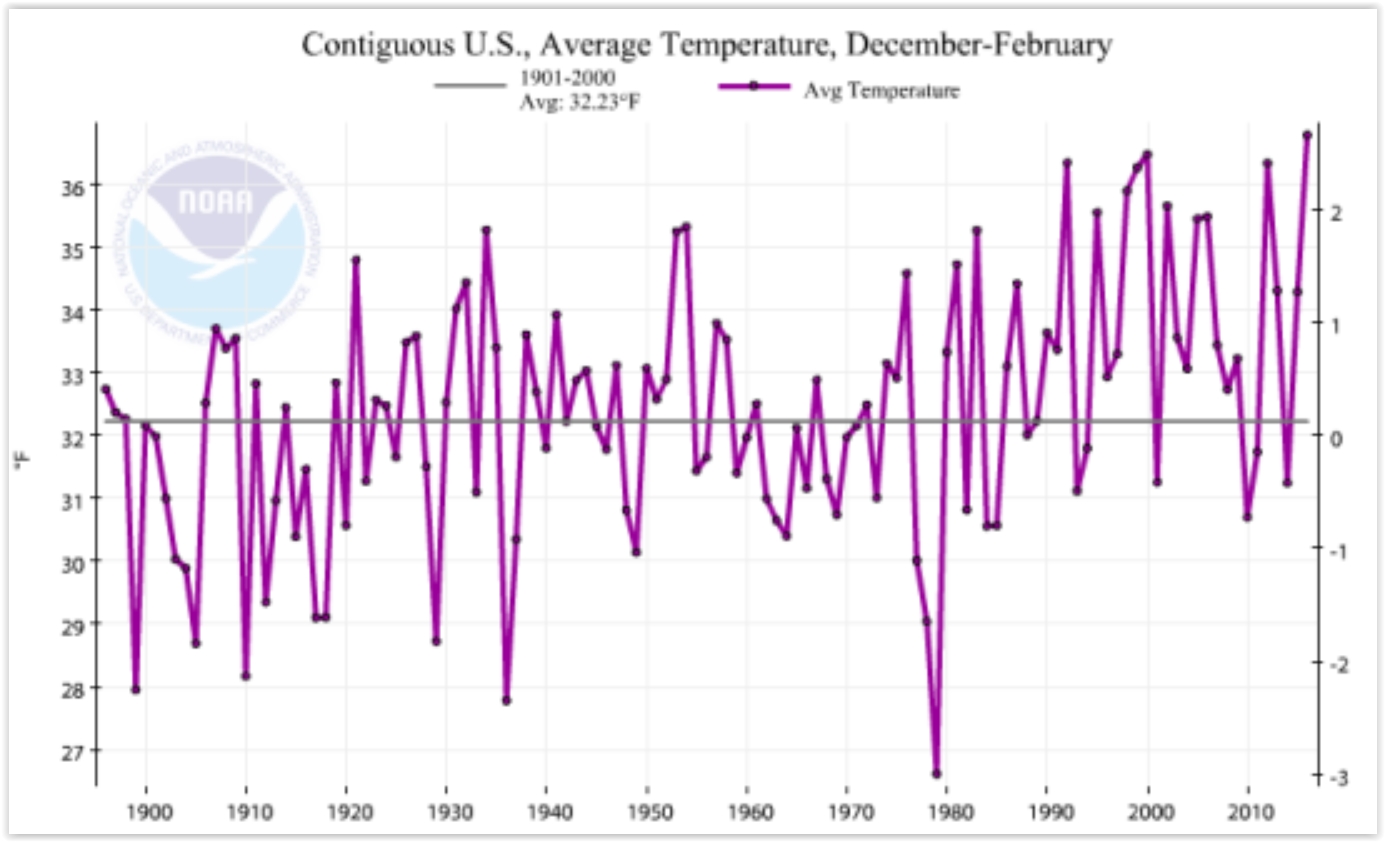 It's Official: This Was America's Warmest Winter on Record
It's Official: This Was America's Warmest Winter on Record. More perspective from Eric Holthaus at
Slate; here's a clip: "..
.NOAA blames the recent warm weather on a record-strength El Niño
“and other climate patterns,” most notably, global warming. As a whole,
this winter in the lower 48 was about 4.6 degrees Fahrenheit warmer
than the 20th century average: a sharp contrast to the
previous back-to-back frigid polar vortex winters, especially in the
Northeast. But that doesn’t mean there was a lack of wintry weather: New
York City, for example, had one of its warmest and snowiest winters on
record, an odd combination to say the least..."
Graphic credit above: "Winters are warming, and this was the warmest one yet." NOAA.
This 23-Second Video Shows Old Arctic Sea Ice's Demise. Thickness matters at the top of the world, it turns out. Here's a video link and story excerpt from
Climate Central: "...
Warming air and water
has eroded away much of the Arctic’s oldest ice, leaving behind brittle
young ice that melts faster. In 1985, ice older than 4 years comprised
20 percent of all Arctic ice pack. By 2015, it was just 3 percent. That
puts the oldest sea ice on the brink of extinction. In comparison, young
ice used to be about half of all Arctic ice pack in 1985. Now it’s
about 70 percent. You might think younger sounds better, but you would
be sadly mistaken. That’s because older sea ice is stronger and less
prone to melt than its younger counterpart. The transition from old to
young is in part why summer melt seasons have become more and more
dramatic in the Arctic..."
Warming Climate Helps North Canada Miners Ships Supplies, Melts Locals' Ice Roads. Threat, and opportunity. Here's an excerpt from a story at
Reuters: "
Global
warming is making it easier for resource companies to ship supplies
through Arctic waterways in northern Canada, but harder for remote
communities to truck in food on winter ice roads, mining industry
officials and indigenous leaders said.
Shifting transportation patterns in the far north due to the changing
climate are expected to reduce the cost of mining and other projects in
once frozen coastal areas, while raising the price of goods for
residents and businesses operating inland.
Ice roads, built on frozen waterways, have until recently provided
crucial winter transportation links to northern communities which have
no regular road access..."
GFS Surface Temperature Anomaly valid this morning, courtesy of Climate Reanalyzer.
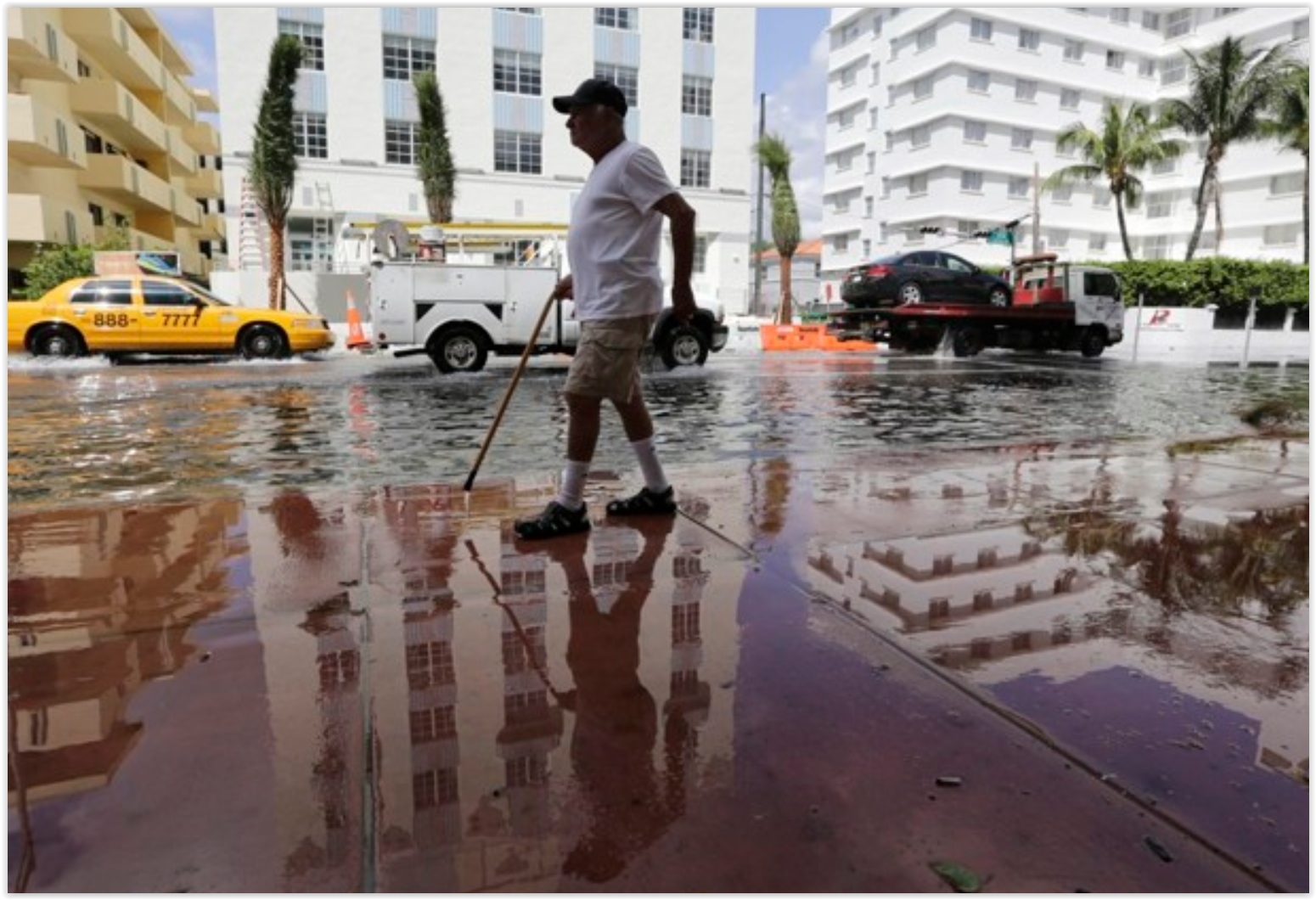 Investors in Miami Are Buying Up Land At Higher Elevations.
Investors in Miami Are Buying Up Land At Higher Elevations. Rent, don't buy, Unless you have money to burn (or flood). Here's an excerpt from The Atlantic's
CityLab: "...
Even
if global emissions dropped dramatically today, the city would still be
locked in for 15 feet of sea-level rise over the next 200 years, says
Jeff Onsted, an associate professor at Florida International
University’s Sea Level Solutions Center. The rising water won’t be
produced by a single weather event, but will gradually become a part of
residents’ lives. And while major cities such as New York can build
seawalls, Miami is defenseless because it’s built on porous limestone
that would allow ocean water to come up from under the city. Already,
yards and streets remain flooded even days after rainstorms have rolled
through the city. But this looming threat isn’t detectable in the
massive ongoing construction along the waterfront in Miami..."
File photo: Lynne Sladky / AP.
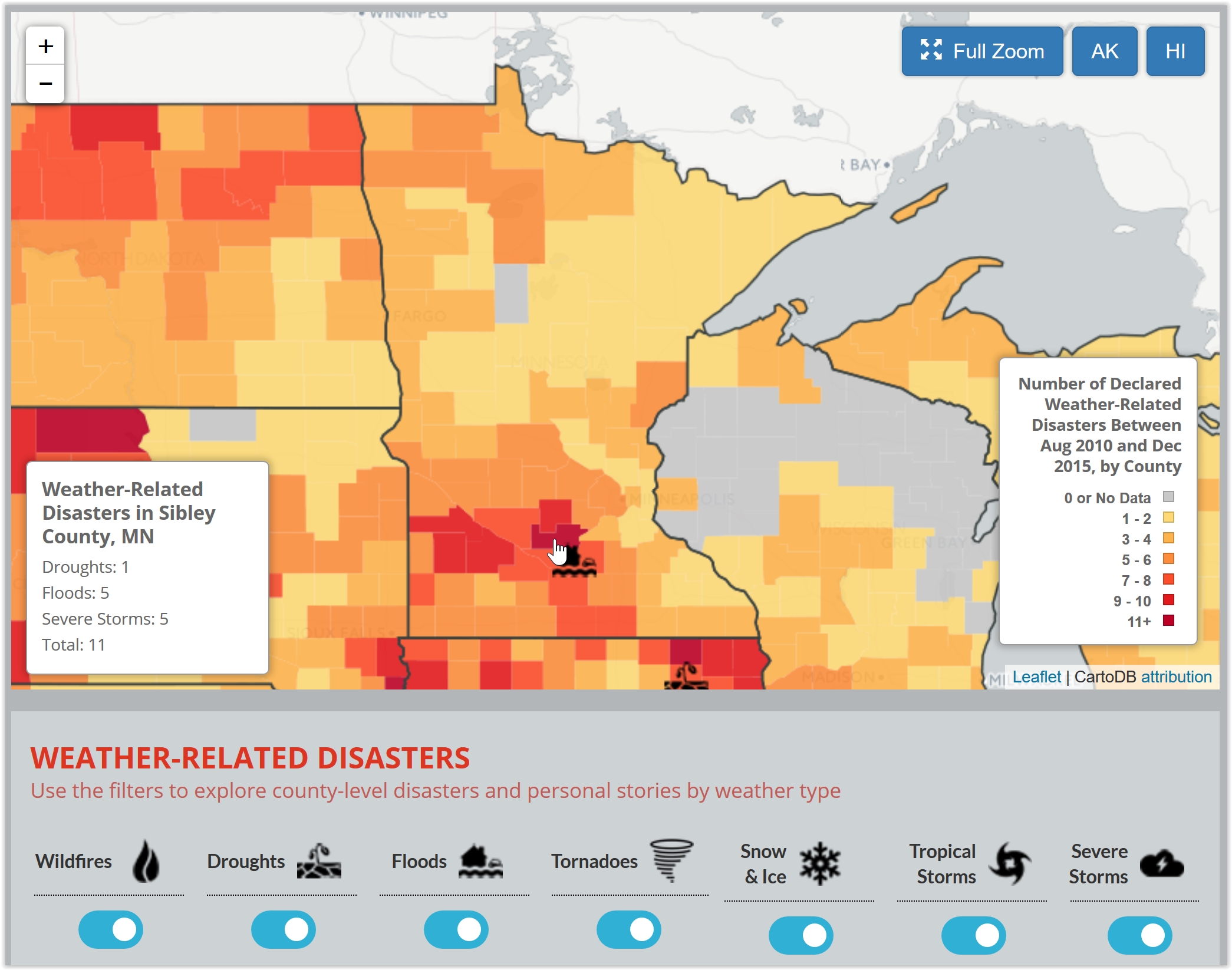 Extreme Weather Disasters Since 2010.
Extreme Weather Disasters Since 2010. A short window of data, but an interesting overview of state and national trends in recent years, courtesy of
Environment America: "
Every
year, weather-related disasters injure or kill hundreds of Americans
and cause billions of dollars in damage. Many of the risks posed by
extreme weather will likely increase in a warming world. Scientists have
already noted increases in extreme precipitation and heat waves as
global warming raises temperatures and exacerbates weather extremes.
The stories shared on the map show how global warming is affecting our
lives as individuals. The negative impacts of global warming are felt
differently by different people, depending their age, health and
circumstances. For some, record heat can be life-threatening, while
large snow storms can leave others trapped inside..."
U.S. Solar Growth Will More Than Double in 2016, Study Finds. Here's an excerpt at Bloomberg Business: "...A
key reason solar is booming is the cost of panels, which have plunged
67 percent since 2010, according to SEIA. In the months leading up to
2016, companies lined up record numbers of projects to take advantage of
a 30 percent federal tax credit that had been set to expire at the end
of the year. Congress voted in December to extend the program through
the end of 2021. Large utility-scale projects will account for roughly
75 percent of new installations this year, adding 12 gigawatts,
according to the study, which was conducted by Boston-based GTM Research..."
"Don't Let The Planet Bern: Column".
Could some of the policies Bernie Sanders is proposing inadvertently
increase greenhouse gas emissions? Ted Nordhaus has an Op-Ed at
USA TODAY; here's an excerpt: "...
But a careful look at Sanders' actual proposals tells a different story. He proposes to retire the nation’s nuclear reactors, which are the nation’s largest source of zero-carbon energy and generate 20% of the nation’s electricity
and 60% of its zero-carbon power. Doing so would result in power sector
emissions rising over 20% by 2050. Sanders has vowed if elected to
rewrite the Obama administration's Clean Power Plan (which primarily
restricts coal use) to make it tougher on natural gas. Doing so would gut the
rule. Regulation of carbon emissions from the power sector under
provisions of the Clean Air Act depends almost entirely on the
Environmental Protection Agency’s determination that cheap natural gas
generation is the “best available” alternative to coal power plants..."
The "Echo" from Amazon Brims With Groundbreaking Promise. Sort a big, lumpy, stationary Siri, but
The New York Times highlights some interesting new technology: "...
This
time it may be different. A bit more than a year after its release, the
Echo has morphed from a gimmicky experiment into a device that brims
with profound possibility. The longer I use it, the more regularly it
inspires the same sense of promise I felt when I used the first iPhone —
a sense this machine is opening up a vast new realm in personal
computing, and gently expanding the role that computers will play in our
future. What is most interesting about the Echo is that it came out of
nowhere. It isn’t much to look at, and even describing its utility is
difficult..."
Don't Mess With Ostriches.
Some things you just have to see to believe. Who knew ostriches could
run this fast? Remember that the next time you pass one on a bike.
Here's an amazing video clip from
The Telegraph: "
Headcam footage shows an ostrich running at a terrifying 50km/h after a group of cyclists in South Africa."
Please Stop Using "Neanderthal" as an Insult, Say Neanderthal Experts. Atlas Obscura explains: "...
Scientifically speaking, a Neanderthal is a species or subspecies of human that went extinct about 40,000 years ago, after spending much of the Pleistocene hunting and gathering around Eurasia. Colloquially speaking, though, a Neanderthal is—as the Oxford English Dictionary puts it—“a
primitive, uncivilized, or loutish person,” “politically or socially
reactionary,” or “a male chauvinist.” In the past few days alone,
journalists looking for a good jab have used the term to describe
everything from Donald Trump to soccer fans to an outdated car engine..."
Photo credit above: "
A respectable Neanderthal looks out over the crowd at the Neandertal-Menschen in Germany." (Photo: suchosch/CC BY-SA 2.0)
The "Most Interesting Man in the World" Just Lost His Job. Say it isn't so! If he can't keep a gig who can? The Washington Post has the morbid details: "...Andrew
Katz, the brand’s vice president of marketing, said the actor would be
replaced to reflect how society has transformed over the years. “Culture
has changed very dramatically,” Katz told USA Today.
“Our Millennial drinker has changed quite dramatically, and the
competition has only exploded with the advent of craft [beer]. We just
want to make sure that the story evolves.” The title of the Most
Interesting Man will remain, but it will be given to someone else..."
Photo credit: "
Adios, amigo." (Dos Equis via AP).
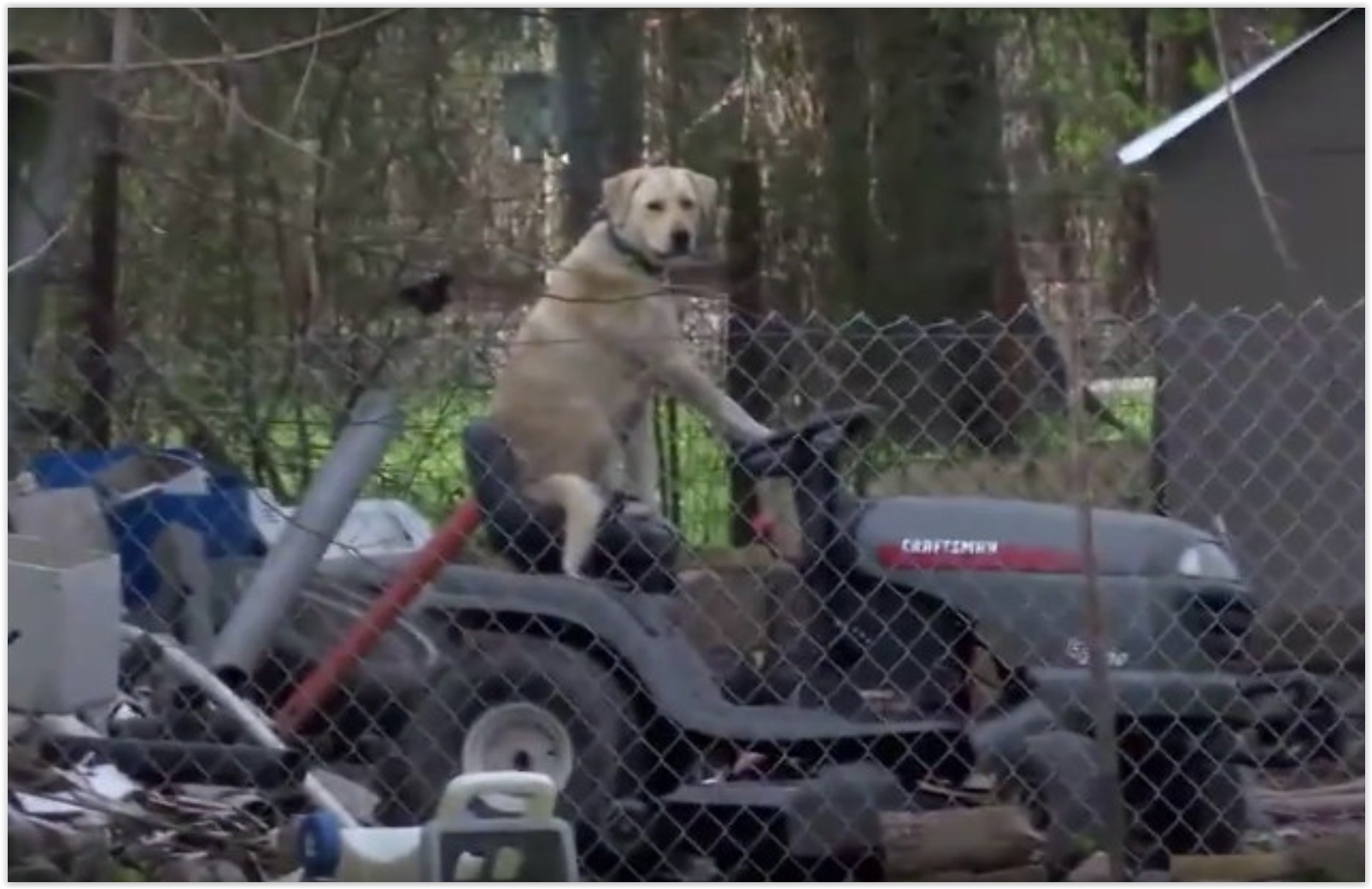 Solemn TV News Report About Texas Tornado Interrupted by Dog on Lawnmower. We live in a great nation, don't we? Even our dogs have the freedom to mow the lawn. Here's a video link and story excerpt at Geekologie: "Because
news reporting is serious business (and nobody takes it more seriously
than me), this is a video from a local news report about the recent
tornado damage in Malakoff, Texas that gets interrupted when the
reporter spots a dog sitting on a ride-on lawnmower. Honestly though, I would have done the same thing. "Gotten distracted?" What? No. I meant sit on that lawnmower if I was a dog
Solemn TV News Report About Texas Tornado Interrupted by Dog on Lawnmower. We live in a great nation, don't we? Even our dogs have the freedom to mow the lawn. Here's a video link and story excerpt at Geekologie: "Because
news reporting is serious business (and nobody takes it more seriously
than me), this is a video from a local news report about the recent
tornado damage in Malakoff, Texas that gets interrupted when the
reporter spots a dog sitting on a ride-on lawnmower. Honestly though, I would have done the same thing. "Gotten distracted?" What? No. I meant sit on that lawnmower if I was a dog..."

TODAY: Outdoor lunch-worthy. Sunny and spectacular. Winds: S 10-20+ High: 63
FRIDAY NIGHT: Clear and mild. Low: 43
SATURDAY: Nicer day, fading sunshine late. Winds: S 7-12. High: 65
SATURDAY NIGHT: Cloudy with showers moving in. Low: 49
SUNDAY: Cloudier & humid, few showers likely. Winds: SE 8-13. High: near 60
MONDAY: Dry out - peeks of lukewarm sun. Winds: NW 5-10. Wake-up: 51. High: 63
TUESDAY: Rain, possible T-storms. Winds: SE 10-20. Wake-up: 53. High: near 60, then falling late
WEDNESDAY: Rain may change to snow, very windy! Winds: NW 15-40+ Wake-up: 39. High: 42
THURSDAY: Raw, few sprinkles or flurries. Winds: NW 10-20. Wake-up: 33. High: 38
Climate Stories....
Obama and Justin Trudeau from Canada Unveil Efforts to Fight Climate Change. The New York Times reports: "
Justin Trudeau, the prime minister of Canada, met with President Obama
on Thursday for the first state visit by a Canadian leader in 19 years,
a diplomatic honor made possible in part by new pledges of cooperation
on combating climate change.
Mr. Obama and Mr. Trudeau announced Thursday morning new commitments to
reduce planet-warming emissions of methane, a chemical contained in
natural gas that is about 25 times as potent as carbon dioxide and that
can leak from drilling wells and pipelines..."
Photo credit above: "
Prime
Minister Justin Trudeau of Canada and President Obama at the arrival
ceremony on the South Lawn of the White House on Thursday."
Credit Zach Gibson/The New York Times.
Democrats Finally Talk Climate Change - And Remind Us All How Politically Tricky It Can Be. Because the way we're all wired makes it very challening dealing with future risk. Here's an excerpt from The Washington Post: "...Shortly after Hurricane Sandy, the New Yorker's James Surowiecki
noted
a critical political problem for any climate action. Referring to a
report from economist Andrew Healy and political scientist Neil
Malhotra, he writes:
Politically
speaking, it’s always easier to shell out money for a disaster that has
already happened, with clearly identifiable victims, than to invest
money in protecting against something that may or may not happen in the
future. Healy and Malhotra found that voters reward politicians for
spending money on post-disaster cleanup, but not for investing in
disaster prevention, and it’s only natural that politicians respond to
this incentive.
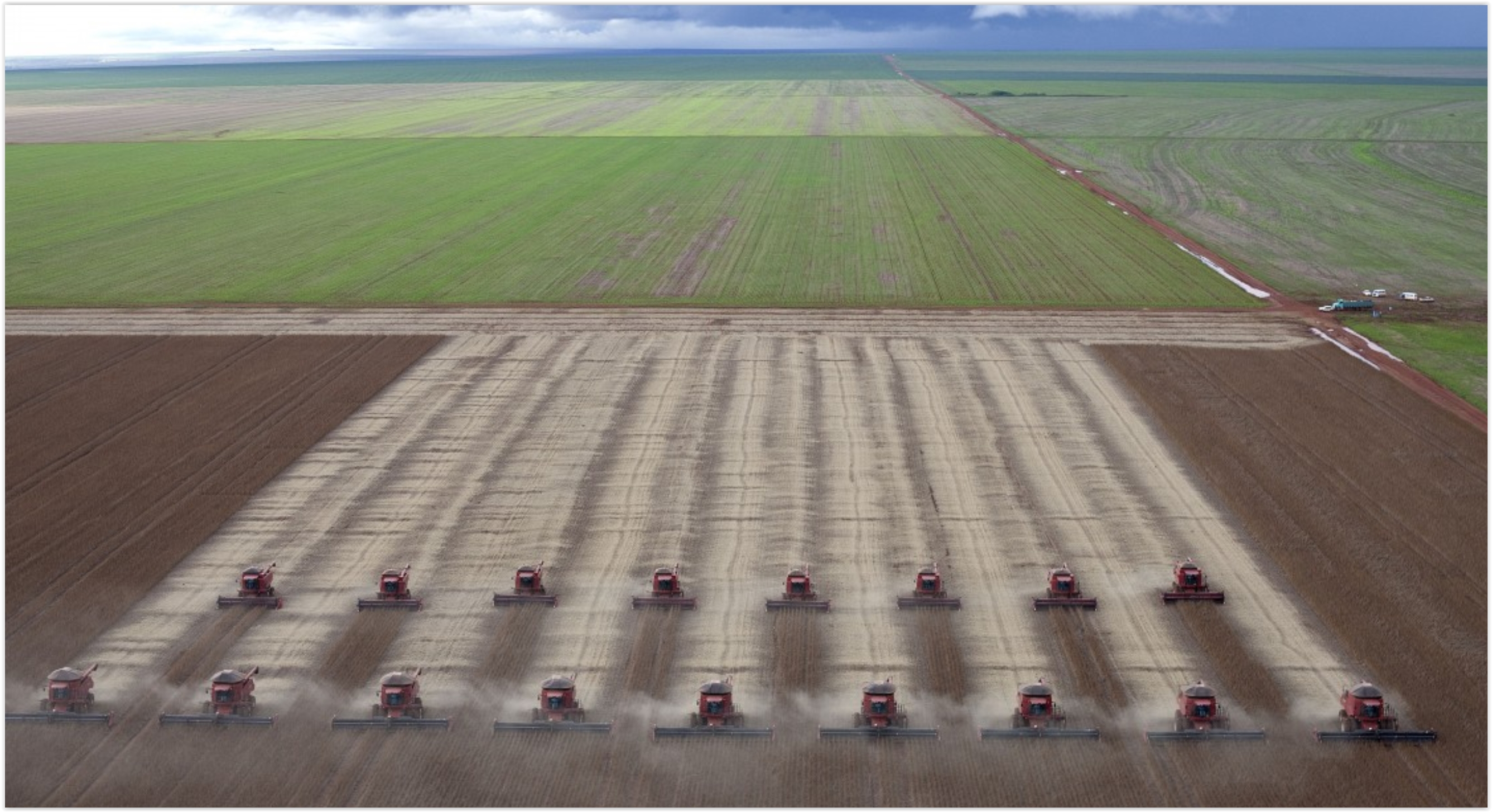 The Unexpected Reaction Farmers Could Have to Climate Change. Here's an excerpt of a story at ThinkProgress that got my attention: "...These
farmers, they’re operating on a razor’s edge,” Avery Cohn, assistant
professor of environment and resource policy at Tufts, told
ThinkProgress. “They need to get their crops in the ground as soon as
they can, they are planting short cycle soy varieties that they need to
harvest at the peak of the rainy season, and then they need to plant
that corn at the peak of the rainy season, and then hope that the rainy
season lasts long enough so the corn gets enough water.” If climate
change leads to decreasing yields, farmers might respond by taking a
certain amount of their land out of rotation, because it’s no longer
profitable. Or farmers might decide not to plant a second crop — a
technique known as double cropping — and instead focus on getting the
most out of their primary crop, another decision that could lead to
reductions in overall agricultural yields.
The Unexpected Reaction Farmers Could Have to Climate Change. Here's an excerpt of a story at ThinkProgress that got my attention: "...These
farmers, they’re operating on a razor’s edge,” Avery Cohn, assistant
professor of environment and resource policy at Tufts, told
ThinkProgress. “They need to get their crops in the ground as soon as
they can, they are planting short cycle soy varieties that they need to
harvest at the peak of the rainy season, and then they need to plant
that corn at the peak of the rainy season, and then hope that the rainy
season lasts long enough so the corn gets enough water.” If climate
change leads to decreasing yields, farmers might respond by taking a
certain amount of their land out of rotation, because it’s no longer
profitable. Or farmers might decide not to plant a second crop — a
technique known as double cropping — and instead focus on getting the
most out of their primary crop, another decision that could lead to
reductions in overall agricultural yields..."
File photo: AP Photo/Andre Penner.
The Constitutional Right to a Healthier Climate. Dr. James Hansen has an Op-Ed at The Boston Globe; here's a clip: "...On
Wednesday, a judge in US District Court in Oregon will consider whether
a constitutional challenge to federal actions that underwrite fossil
fuel emissions may proceed. Brought by youth plaintiffs, and by me, on
behalf of future generations, the lawsuit alleges that by permitting,
authorizing, and subsidizing the exploitation, production, transport,
and burning of fossil fuels, our government has caused or substantially
contributed to the present emergency in which the very viability of a
hospitable climate system is at stake. We argue that such federal
actions infringe upon the fundamental guarantees of the Fifth Amendment,
including the rights to life, liberty, property, and equal protection
of the law..."
Satellite or Surface Temps: Which Is More Accurate? Yale Climate Connections
has produced a video explaining the advantages and disadvantages of
surface instruments vs. (inferred) temperatures from satellite
platforms: "
Scientists clarify how best to understand global temperatures and how they are measured."
 Highest Ever Annual Rise in Carbon Dioxide Levels Reached. New Scientist
Highest Ever Annual Rise in Carbon Dioxide Levels Reached. New Scientist has an update; here's the intro: "
It is not just temperature records that are falling. The average carbon dioxide level
recorded at Mauna Loa, Hawaii, during February 2016 was 404.02 parts
per million – 3.76 ppm higher than the average for February 2015,
according to preliminary figures.
That is the biggest ever increase over a 12-month period. The previous
12-month record at Mauna Loa was 3.70 ppm, from September 1997 to
September 1998..."
Photo credit above: "Mauna Loa Observatory in Hawaii." NOAA.
The New Minnesota Winter. Thanks to
KARE-11
and "Breaking The News" (new 6:30 PM show) for trying to connect the
dots and put our abbreviated winter into larger context. Here's a video
link and story excerpt: "...
Douglas said warming trends will put
stress on agriculture, wetlands, lakes, invasive species, and pest
control, but to him, it’s more motivation, especially looking toward the
next generation, to make sure the region’s subzero history finds an
above average solution. “For many Minnesotans, we are losing something
that’s intrinsic, part of our heritage and history and that is deeply
troubling,” said Douglas. “But, I'm still optimistic, I think it's our
kids that will clean up our parents’ messes.”
Can Christianity Make the U.S. Care About Climate Change? It's probably necessary to engage both the mind and the heart; appealing to Creation Care and stewardship. Here's a clip from
Newsweek: "...
Momentum
for this moral approach to climate action reached new heights when Pope
Francis made environmentalism a pillar of his papacy. The effort began
with his choice of namesake—Saint Francis of Assisi, who is considered
the unofficial patron saint of ecology—and reached a crescendo this past
summer with the release of a nearly 200-page
encyclical, “Laudato Si’: On Care for Our Common Home.” In it, the
pontiff argues that we need to accept climate change as real and
recognize that if we don’t do anything about it, it will soon cause
devastation to the poor and disadvantaged across the world. Speaking
from the South Lawn of the White House this fall, Francis issued a call
to action: “Climate change is a problem which can no longer be left to
our future generation.
I would like all men and women of goodwill in this great nation to
support the efforts of the international community to protect the
vulnerable in our world...”
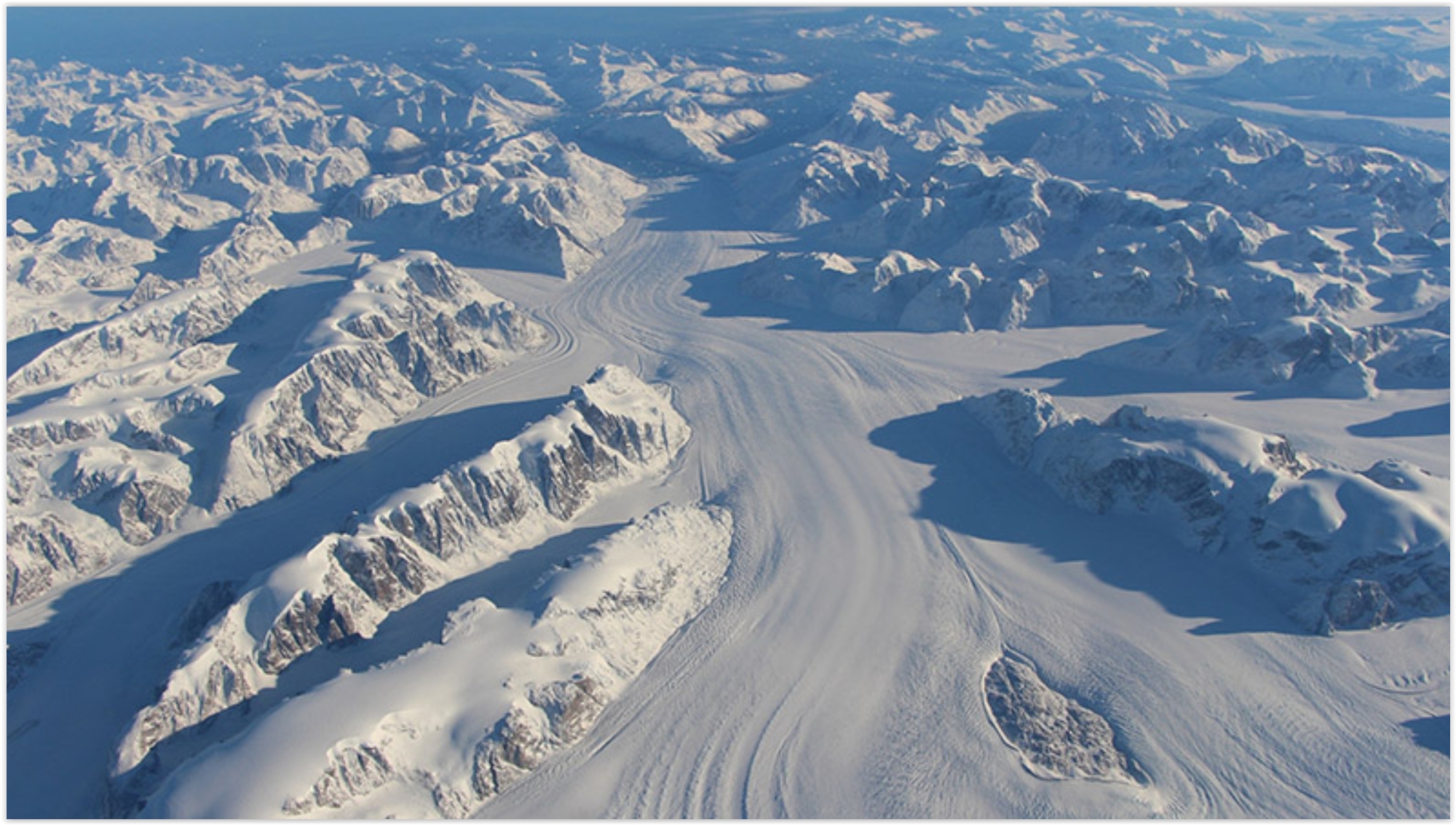 Darkening Greenland Ice Sheet Melts Faster
Darkening Greenland Ice Sheet Melts Faster. Here's an excerpt from
Climate Home: "
Greenland
is getting darker. Climatology’s great white hope, the biggest block of
ice in the northern hemisphere, is losing its reflectivity. According
to new research, the island’s dusty snows are absorbing ever more solar
radiation, which is likely to accelerate the rate at which the icecap melts.
The Greenland icecap covers 1.7 million square kilometres and contains
enough ice to raise sea levels by seven metres. Right now, the rate of
melting is on the increase, and meltwater flowing off the icecap could be raising sea levels by 0.6mm a year..."
Photo credit above: "
Greenland’s white ice sheet is not as pristine as it looks." (Pic: NASA/Flickr).
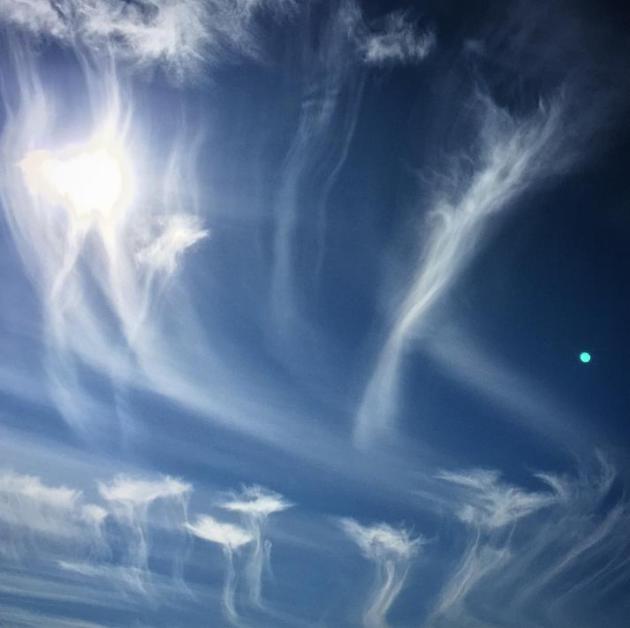
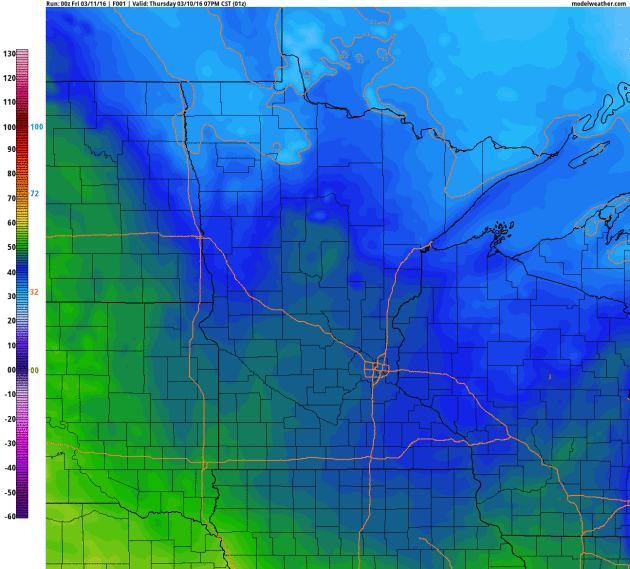
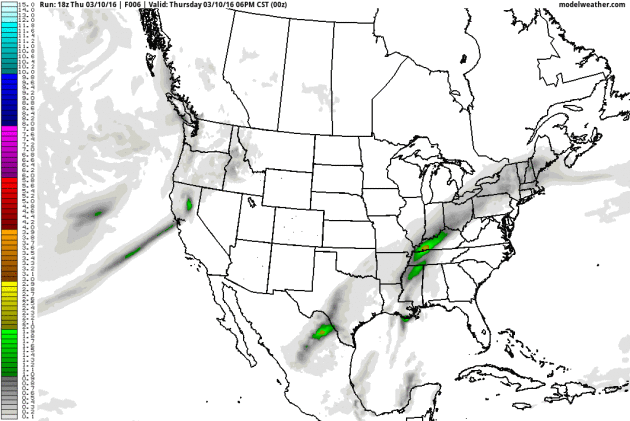
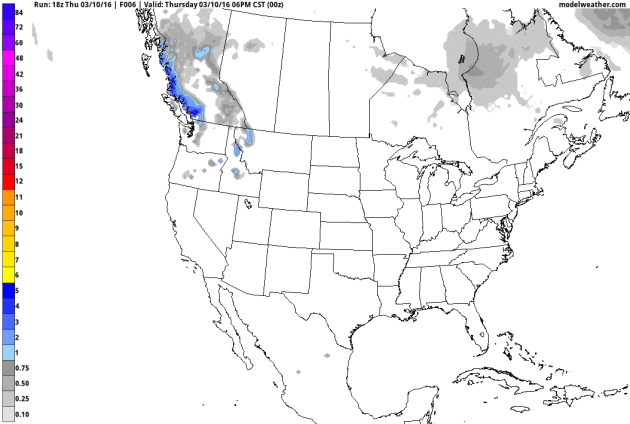
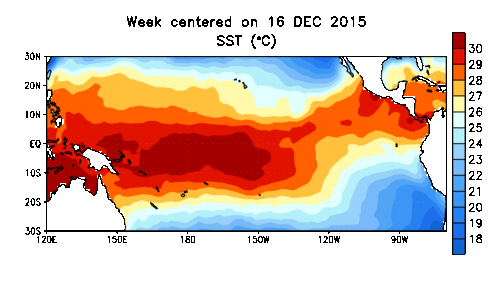
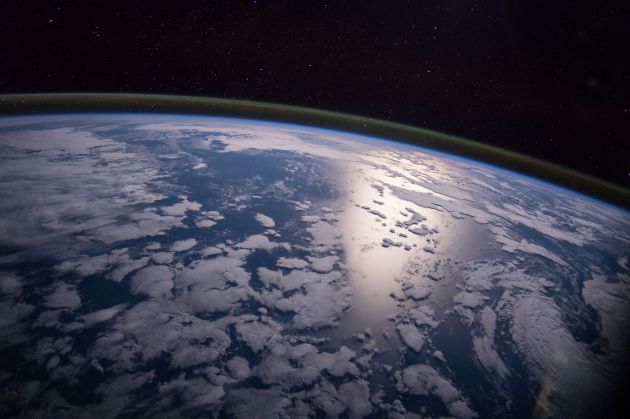
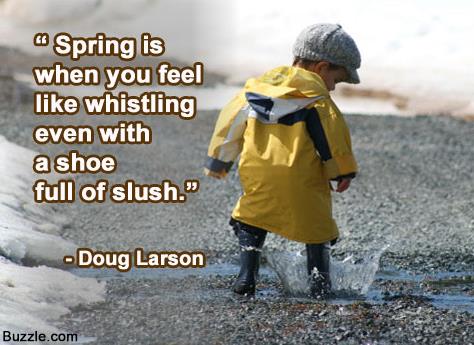
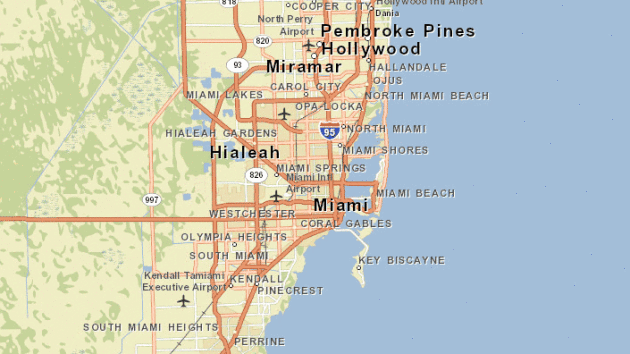
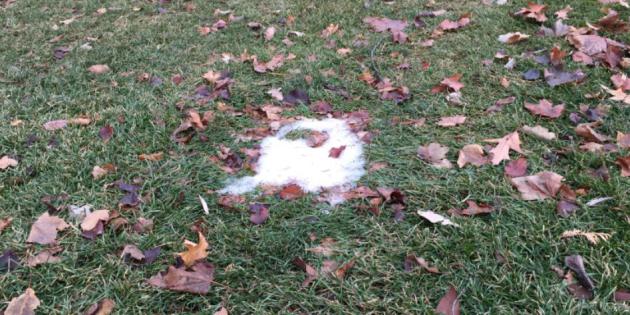
No comments:
Post a Comment